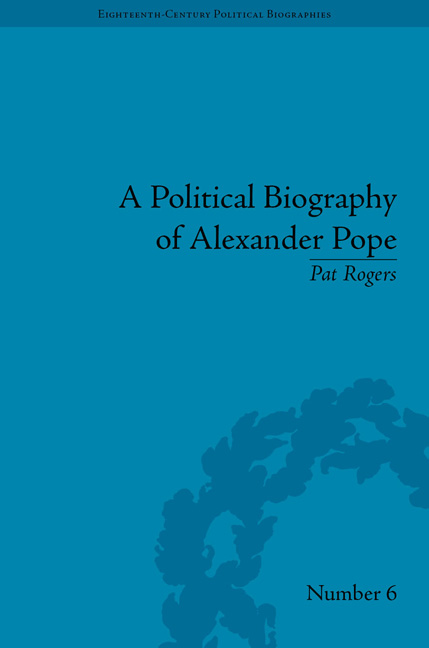Book contents
- Frontmatter
- CONTENTS
- Dedication
- Acknowledgements
- Abbreviations
- Dates and Quotations
- Sources
- Introduction
- Part I William and Anne, 1688–1714
- Part II George I, 1714–27
- Part III George II, 1727–44
- 7 Dunce the Second Reigns
- 8 Libels and Satires
- 9 Friendship and Opposition
- Epilogue: After Walpole
- Notes
- Works Cited
- Index
8 - Libels and Satires
from Part III - George II, 1727–44
- Frontmatter
- CONTENTS
- Dedication
- Acknowledgements
- Abbreviations
- Dates and Quotations
- Sources
- Introduction
- Part I William and Anne, 1688–1714
- Part II George I, 1714–27
- Part III George II, 1727–44
- 7 Dunce the Second Reigns
- 8 Libels and Satires
- 9 Friendship and Opposition
- Epilogue: After Walpole
- Notes
- Works Cited
- Index
Summary
Libels and Satires! lawless Things indeed!
The First Satire of the Second Book of Horace Imitated (TE, vol. 4, p. 21)When the new decade began, Pope had reached the age of forty-one. All round the outlook seemed distinctly promising. The Dunciad brought him new confidence in his creative powers, and established him as the most dreaded satirist in the nation. The poem had revived his old enmities, and drawn in a fresh cadre of hostile critics, something he always needed for his art to function effectively. Meanwhile his contacts with friends and colleagues in the Scriblerian group remained positive, not least in the case of Swift, with whom his relations would begin to fray at the edges in later years. Equally he could count on the good will of aristocratic supporters like Bathurst, Bolingbroke and Oxford, together with a newer recruit, Lord Cobham. A serving general until he fell into disfavour on political grounds, and a member of the influential Temple family, Cobham had carried out extensive improvements to his house and garden at Stowe in Buckinghamshire. Over the course of time this site became a focus of opposition to Walpole, as the dissident group met there to forge mostly ineffectual plots against the ministry. Pope visited Stowe regularly from about 1724, and contributed his views on the gardens, which boasted the handiwork of the architects James Gibbs and John Vanbrugh, together with the landscape designers Charles Bridgman and William Kent. Once in 1731 he gave his opinion that ‘If any thing under Paradise could set me beyond all Earthly Cogitations: Stowe might do it’ (Corr., vol. 3, p. 217).
Pope now gained support in his war with Grub Street. Encouraged by the example of The Dunciad, a new organ named the Grub-Street Journal began publication on 1 January 1730: it would appear every week for more than 400 issues until 1738. Pope's enemies claimed that he took a leading share in the operations of the paper. This does not seem to be true, although the main writers, a nonjuring clergyman named Richard Russel and a botanist named John Martyn, certainly looked to him for inspiration. Several of the poet's principal butts made regular appearances, including Cibber, Theobald, James Moore Smythe, John ‘Orator’ Henley and Curll.
- Type
- Chapter
- Information
- A Political Biography of Alexander Pope , pp. 175 - 200Publisher: Pickering & ChattoFirst published in: 2014



